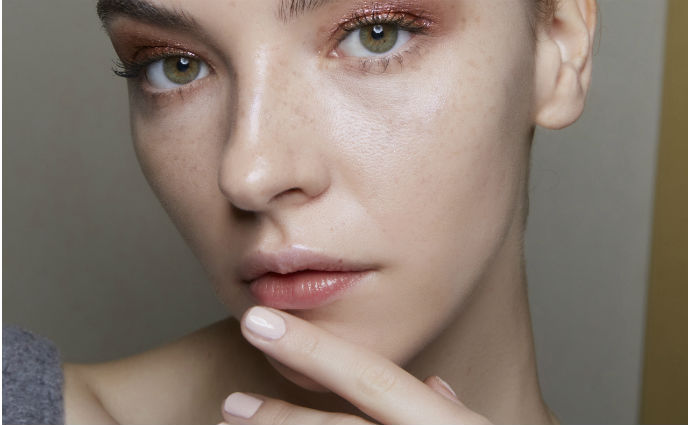Dr. Barbara Sturm, founder and CEO of Dr. Barbara Sturm Molecular Cosmetics, recommends her clients wear sunscreen under their masks for several reasons. She points out that cloth masks have a SPF of around seven, "which is well below what skin needs to be fully protected from the sun." Sturm also notes that people tend to wear masks loosely and pull them down in certain cases, which leaves skin completely exposed to damaging UVA rays.
Image via Imaxtree
Another reason to continue slathering on SPF? Board-certified dermatologist Dr. Naissan Wesley explains that many modern sunscreens contain antioxidants or ingredients that help protect against (and even reverse) damage created from environmental pollution and sun exposure.
"The best sunscreen is the one you WANT to put on and reapply," says Linkner. "Compliance is key. So if that means you prefer a mineral-based product like Rodan + Fields Soothe Daily Mineral Sunscreen SPF 30, $40, that doesn't rub off as easily on your mask that makes sense to me."
To help prevent dreaded maskne, Wesley suggests a noncomedogenic sunscreen like Arbonne RE9 Advanced Prepwork Soft Focus Veil Broad Spectrum SPF 30 Sunscreen, $44. "Having some type of topical on, whether it's a sunscreen or a cream or serum, is better than having nothing on the skin under the mask because having that barrier between your skin and the mask helps prevent irritation and maskne."
Image via Imaxtree
In addition to being safer, applying sunscreen to your entire face is simply easier, according to Sturm. That way you don't have to worry about missing spots. Masks are prone to shifting, after all. So you even want to protect your lips. Kissers have very thin skin that can be damaged by the sun and are very susceptible to mask friction. EOS The Guardian 100% Natural SPF 30 Lip Balm, $3.49, offers protection from UVA and UVB rays to cover all your bases.
Image via Imaxtree
There are more masks and designs by the day. They vary in terms of protection against the virus and the sun. But masks don't guarantee sun protection.
"As a general rule, the darker and more tightly woven the fabric is, the more protection it affords," says Dr. Elizabeth Hale, board-certified dermatologist and clinical associate professor of dermatology at New York University Langone Medical Center. "However, masks that are light in color and material (both surgical and cloth) let through some ultraviolet rays with no real regulation so it's a good idea to protect your entire face every day."
That doesn't mean you can skip sunscreen when wearing a dark mask. A black mask does offer slightly more sun protection, as does a denser weave, but it's still not enough.
On the flip side, Nussbaum recommends masks in lighter colors because they will not attract the sun. She also prefers paper masks for acne-prone patients. "It is really trial and error because there are so many options..."
Image via Imaxtree
Excellent sunscreen habits dictate that we reapply sunscreen (boasting SPF 30 or higher) throughout the day. The same applies when wearing a mask. Linkner suggests reapplying SPF every two hours when outdoors in sustained sunlight, including under your mask. If you're inside most of the day, it's less important to continuously reapply SPF. The most important thing is to get a good first coat in the morning. Hale suggests mineral SPF powders or sprays for easy application.
Image via Imaxtree









